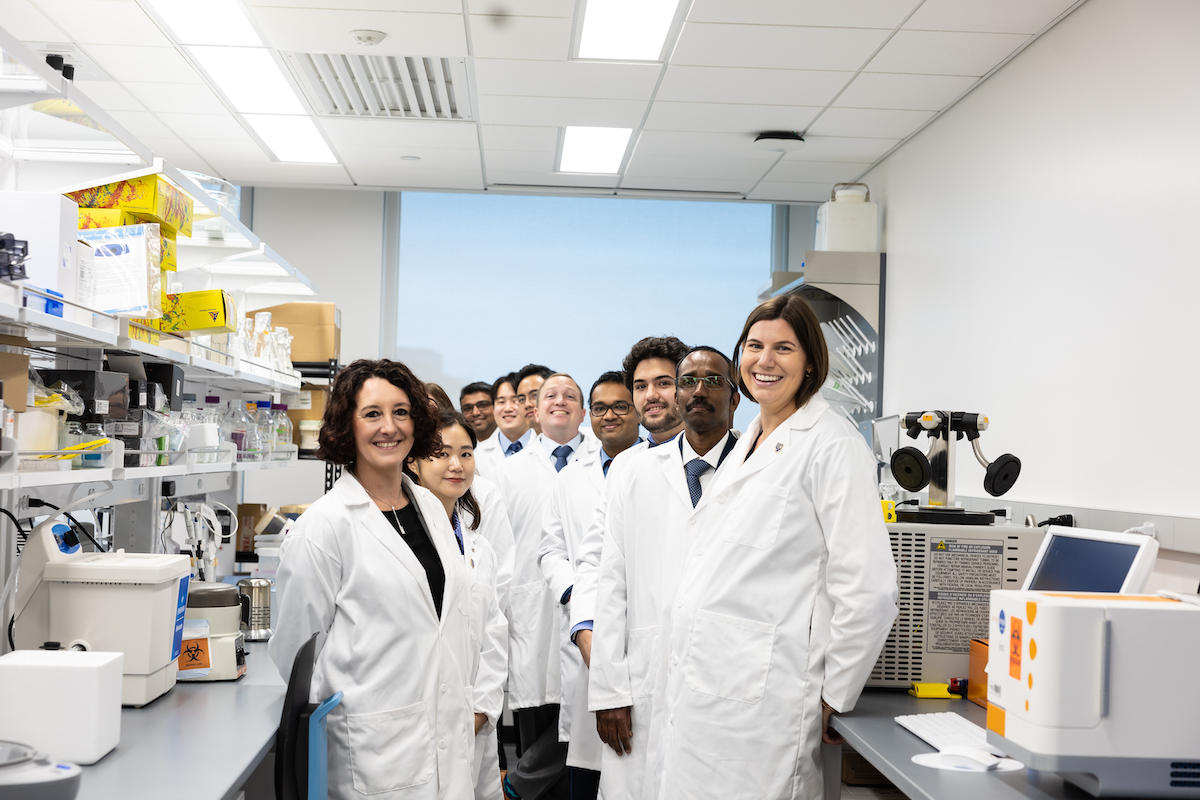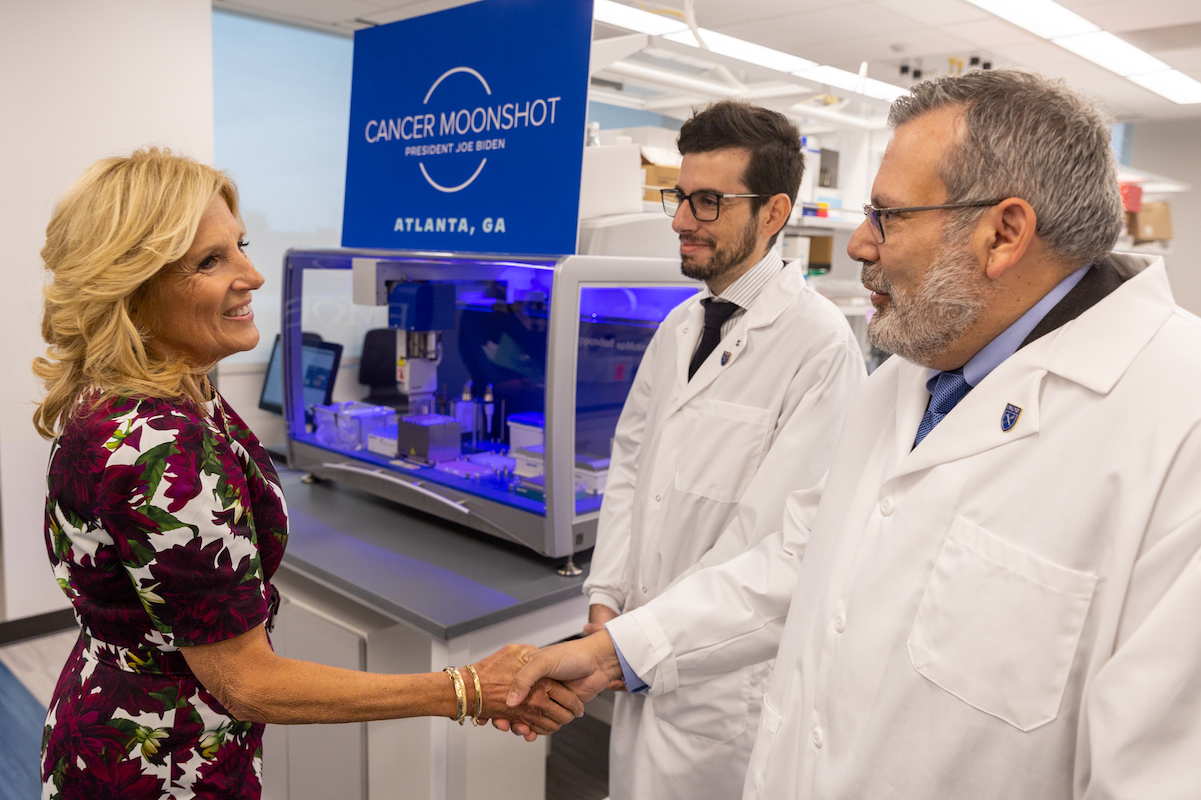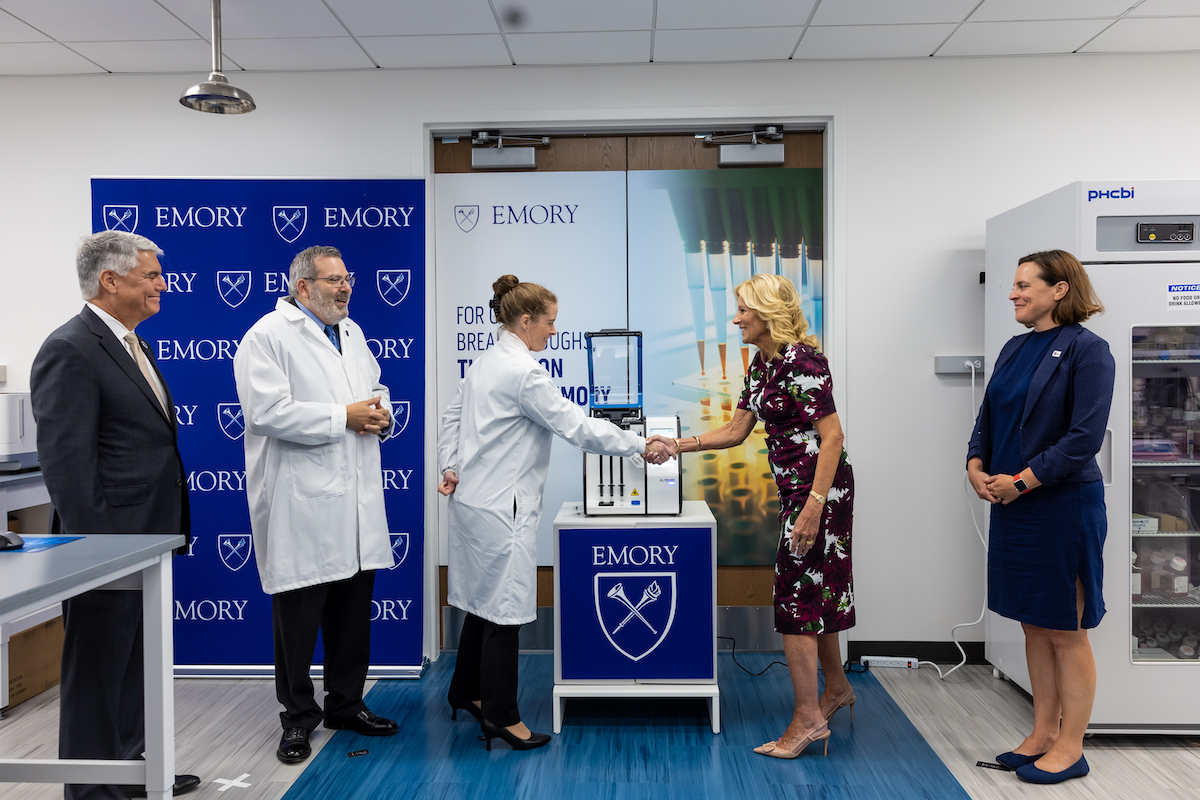Scientists working at the frontiers of knowledge are often surprised. They are trained to follow the data, even when it leads to unexpected paths. But none of the team members in the lab of Emory professor Philip Santangelo imagined that the path would include a visit from first lady Jill Biden.
“None of us could have predicted this,” says Loren Sasser, the lab’s manager. “When we heard that she was coming we were like, what? We couldn’t believe it was happening.”
The first lady’s tour of the lab came on the heels of the announcement by President Joe Biden last month that the U.S. Department of Health and Human Services has selected the Santangelo lab as the first recipient of new funding to support transformative biomedical and health breakthroughs. The three-year, $24.8 million cooperative agreement from the Advanced Research Projects Agency for Health (ARPA-H) supports the goals of the Biden Cancer Moonshot.
A few days before the first lady arrived, a Secret Service advance team walked through the lab to prepare for the logistics. The lab members continued to work on their groundbreaking research focused on the idea of training the immune system using messenger RNA to help prevent, treat and cure cancers and other diseases.
They also straightened up a bit.
“You want to line things up a little nicer when you have the first lady, media and cameras coming through,” Sasser says.
Feeling part of something bigger
“It was a joy and an honor to have her here,” says José Assumpção, a postdoctoral fellow in the lab. “It underscored the responsibility that we have. We’re not doing this research just for our own careers. The government invested heavily in us so that we can make big advances in treating diseases. The feeling that you’re part of something bigger makes you want to excel even more.”
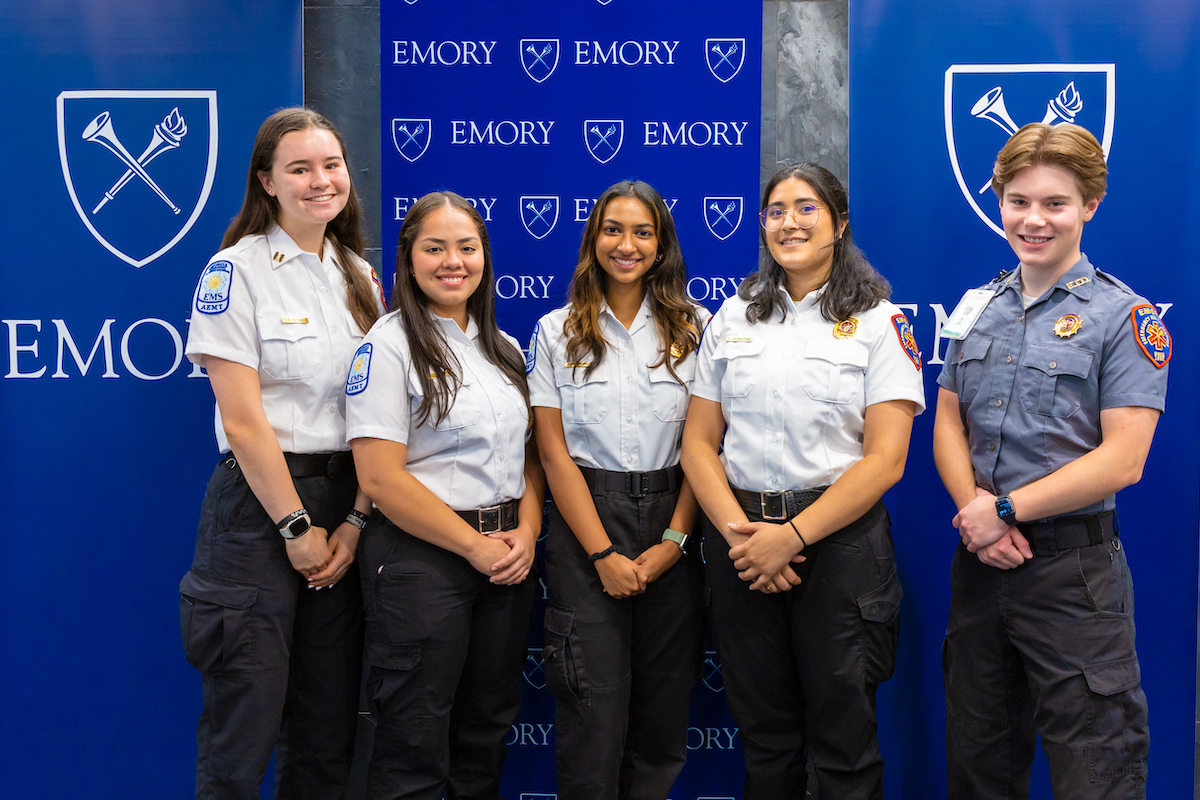
Emory EMS student volunteers attending Biden’s remarks at Emory included (l to r) Ellie Stone, Elva Jantes, Nitya Koduri, Trisha Sengupta and Alex Dolle.
“We're also training students and postdocs — we're training the next generation of scientists — and that's another really important part of our lab’s mission," Santangelo told Biden during the tour. “We're a very interactive lab. I would say we are kind of like a little family in terms of the way we work together and how much time we spend together.”
Santangelo is a professor in the Wallace H. Coulter Department of Biomedical Engineering at Emory and Georgia Institute of Technology, and a researcher at Winship Cancer Institute of Emory University.
A personal touch
“As a mom who watched my son die of cancer, the one thing I never gave up on was hope. As a mother, you can’t,” Biden said after the tour. “This work gives families the power to hold on to that hope just a little bit longer. Because this work could change lives.”
Biden took the time to shake the hand of each individual lab member and thank each one personally.
“I was so surprised to be shaking her hand,” says Jae Yeon Joo, a PhD student in the lab with the Coulter Department of Biomedical Engineering. “It was a once-in-a-lifetime experience."
A native of South Korea, Joo is motivated by doing research with real-life applications. “It’s a great feeling,” he says, “to know that you’re doing really good science and that this science can be very helpful for people.”
The research is challenging, he adds, “but I am working with good friends, lab members who are super smart, from a lot of different countries and different backgrounds, who are always willing to help you if you need it.”
He is grateful that Santangelo is open to trying new approaches. “Our project is ambitious but I believe that we can ‘go to the moon,’” Joo says, referring to the Cancer Moonshot. “I think our messenger RNA platform will one day be applied broadly to help treat many different diseases.”
Well-suited for success
Joao Paulo Pera Mendes, the newest member of lab, had not even started working in the facility yet when he heard that he would need to wear a suit his first day because the first lady would be coming to visit.
A native of Brazil, Mendes joined Emory this fall as a PhD student with the Coulter Department of Biomedical Engineering.
He called his mother to ask her advice for which shirt he should wear with a black jacket. “Why do you need a suit?” she asked.
“I can’t tell you just yet,” Mendes replied. Biden’s visit could not be announced at the time for security reasons.
On Friday, he sent his parents the photo of the lab members with Biden.
“My mom was really shocked and proud,” Mendes said. “My dad said, ‘I think you made the right choice of choosing Emory and joining that lab.’”
Inspiration for Emory undergrads
When Trisha Sengupta was a first-year student at Emory, they watched from the sidewalk as the motorcade of President Joe Biden and Vice President Kamala Harris navigated through the Emory campus when the university hosted a conversation with Asian American and Pacific Islander community leaders in the wake of shootings at three Atlanta-area spas.
As a fourth-year student, now studying neuroscience and behavioral biology on the pre-med track, Sengupta was invited to attend the first lady’s remarks following the lab tour. “It felt very full circle, now in my senior year, to get to actually hear her speak,” says Sengupta.
Sengupta was one of several members of the Emory Emergency Medical Service (EEMS), a volunteer-based and student-run organization, invited to the event. The group got to witness Biden’s remarks to the Emory community because of their involvement in the health care field.
EEMS leaders like Ellie Stone, a fourth-year student studying chemistry and political science on the pre-med track, noted how the project could change the lives of patients.
“This investment they’re making with the Cancer Moonshot is something that’s not only a research idea that will hopefully impact lives 20 to 30 years in the future, but will tangibly start impacting lives tomorrow, just as cancer is impacting lives every single day,” says Stone, the division chief of operations at EEMS.
Both Sengupta, the chief of EEMS, and Stone indicated just how much their involvement with EEMS has solidified their passion for health care careers.
“I think my experiences at Emory, especially with EEMS, has taught me a lot about patient care and just being able to help people,” Sengupta says. “EEMS has really cemented my desire to become a physician because I’ve had these opportunities to work with people and talk to patients.”
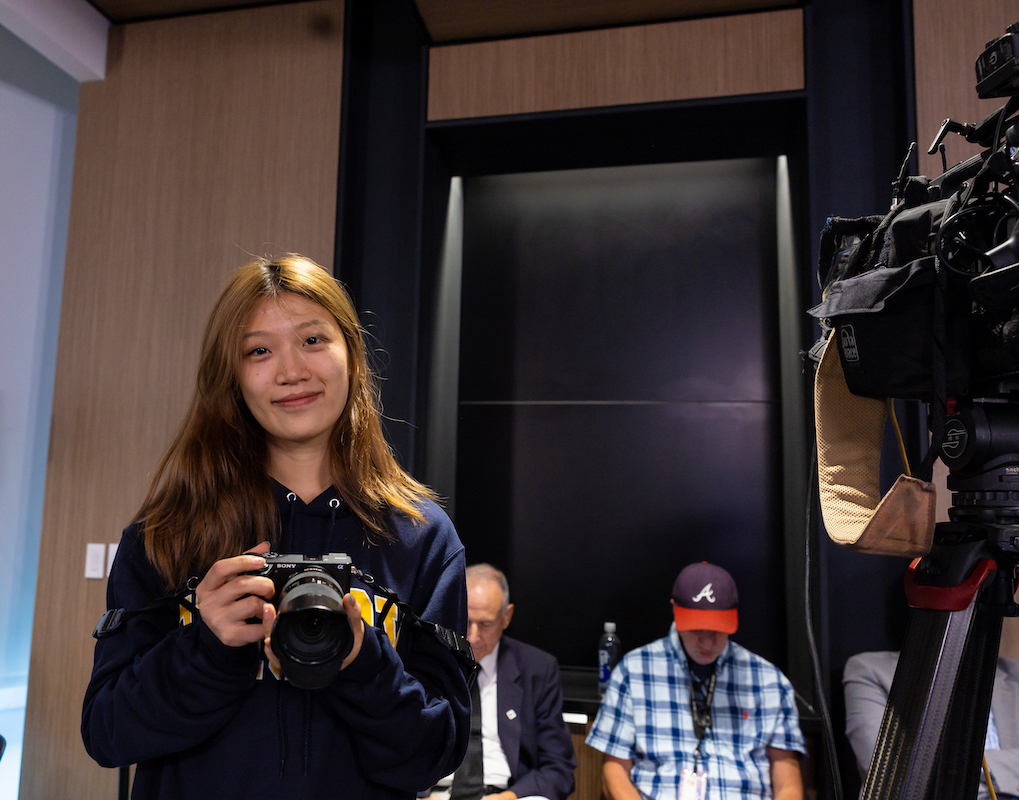
Photographing the Biden visit was one of Kari Zhou’s first assignments for the Emory Wheel, the university’s independent student newspaper.
Photographing the first lady’s remarks was one of her first assignments with the Wheel, although she’s been practicing photography as a hobby for years. Zhou described how impactful it was to hear Biden’s personal connection with cancer.
“I feel like I can really relate with her experiences, and I think that added the power to the launch of this project,” says Zhou.
She noted her pride in being part of the institution that is spearheading research efforts into life-changing health care advancements and documenting it for the Emory community through her work at the Wheel.
“I feel super proud as a member of Emory University to see the first project, the first lab was launched at our school, and I’m really looking forward to seeing any future breakthroughs or updates on that,” says Zhou.


